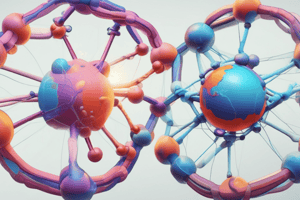Podcast
Questions and Answers
What is the primary factor that determines the polarity of a molecule?
What is the primary factor that determines the polarity of a molecule?
- Type of chemical bonds
- Atomic mass of the atoms
- Molecular shape and symmetry
- Electronegativity difference between atoms in a bond (correct)
Which type of intermolecular force is responsible for the strong attraction between a hydrogen atom bonded to fluorine, oxygen, or nitrogen and a lone pair of electrons?
Which type of intermolecular force is responsible for the strong attraction between a hydrogen atom bonded to fluorine, oxygen, or nitrogen and a lone pair of electrons?
- Ion-dipole force
- Dipole-dipole force
- Hydrogen bonding (correct)
- London dispersion force
Which of the following molecules is non-polar?
Which of the following molecules is non-polar?
- Carbon dioxide (CO2) (correct)
- Water (H2O)
- Ethanol (C2H5OH)
- Ammonia (NH3)
What is the general trend for solubility of ionic compounds in water based on the solubility rules?
What is the general trend for solubility of ionic compounds in water based on the solubility rules?
Which of the following compounds is expected to be insoluble in water according to the solubility rules?
Which of the following compounds is expected to be insoluble in water according to the solubility rules?
What is the primary factor that determines the strength of intermolecular forces?
What is the primary factor that determines the strength of intermolecular forces?
Which type of intermolecular force is responsible for the attraction between non-polar molecules?
Which type of intermolecular force is responsible for the attraction between non-polar molecules?
What is the effect of increasing the strength of intermolecular forces on the boiling point of a substance?
What is the effect of increasing the strength of intermolecular forces on the boiling point of a substance?
Flashcards
Polar molecule
Polar molecule
A molecule with uneven distribution of electron density, creating a partial positive (δ+) and partial negative (δ-) charge.
Dipole-dipole forces
Dipole-dipole forces
The attractive force between polar molecules due to their partial charges.
London dispersion forces
London dispersion forces
The weakest intermolecular force, arising from temporary fluctuations in electron distribution around non-polar molecules.
Hydrogen bonding
Hydrogen bonding
Signup and view all the flashcards
Solubility
Solubility
Signup and view all the flashcards
Solubility rules: Soluble
Solubility rules: Soluble
Signup and view all the flashcards
Solubility rules: Insoluble
Solubility rules: Insoluble
Signup and view all the flashcards
Solubility rules exceptions
Solubility rules exceptions
Signup and view all the flashcards
Study Notes
Polarity
- Molecules can be polar or non-polar, affecting solubility
- Polarity depends on:
- Electronegativity difference between atoms in a bond
- Molecular shape and symmetry
- Polar molecules have a partial positive (δ+) and partial negative (δ-) charge
- Examples of polar molecules: water (H2O), ethanol (C2H5OH)
Intermolecular Forces
- Weak forces between molecules that affect solubility
- Types of intermolecular forces:
- Hydrogen bonding: strong attraction between H atom bonded to F, O, or N and a lone pair of electrons
- Dipole-dipole forces: attraction between polar molecules
- London dispersion forces: weak attraction between non-polar molecules
- Strength of intermolecular forces affects solubility and boiling point
Solubility Rules
- General rules for predicting solubility of ionic compounds in water
- Soluble:
- Compounds containing alkali metals (Group 1) or ammonium (NH4+)
- Nitrates (NO3-), acetates (CH3COO-), and chlorates (ClO3-)
- Alkylammonium ions (e.g., NH4+, RNH3+)
- Insoluble:
- Compounds containing silver (Ag+), lead (Pb2+), or mercury (Hg2+)
- Carbonates (CO32-), phosphates (PO43-), and sulfides (S2-)
- Hydroxides (OH-) except for alkali metals and barium (Ba2+)
- Exceptions: Some compounds may not follow these rules due to specific chemical properties
Polarity
- Molecules can be polar or non-polar, depending on the electronegativity difference between atoms in a bond and molecular shape and symmetry
- Polar molecules have a partial positive (δ+) and partial negative (δ-) charge due to unequal sharing of electrons
- Examples of polar molecules include water (H2O) and ethanol (C2H5OH)
Intermolecular Forces
- Hydrogen bonding is a strong attraction between H atom bonded to F, O, or N and a lone pair of electrons
- Dipole-dipole forces are the attraction between polar molecules
- London dispersion forces are the weak attraction between non-polar molecules
- The strength of intermolecular forces affects solubility and boiling point
Solubility Rules
- Ionic compounds containing alkali metals (Group 1) or ammonium (NH4+) are generally soluble
- Nitrates (NO3-), acetates (CH3COO-), and chlorates (ClO3-) are also soluble
- Alkylammonium ions (e.g., NH4+, RNH3+) are soluble
- Compounds containing silver (Ag+), lead (Pb2+), or mercury (Hg2+) are generally insoluble
- Carbonates (CO32-), phosphates (PO43-), and sulfides (S2-) are insoluble
- Hydroxides (OH-) are insoluble except for alkali metals and barium (Ba2+)
- Exceptions exist due to specific chemical properties
Studying That Suits You
Use AI to generate personalized quizzes and flashcards to suit your learning preferences.




